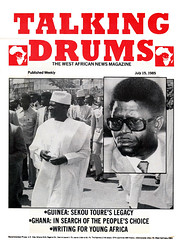Four Years Ago
This article from Ghana's "Free Press" published under 'Editor's Diary' echoes what this magazine has been saying for months.About four years ago something happened in Ghana.
A group of soldiers led by Flt-Lt J.J. Rawlings took up the gun and overthrew the elected representatives of Ghana.
Their justification and cry for legitimacy was that there was going to be a revolution not just a revolution but a revolution to end all revolutions.
At that time some people sincerely believed the hour of revolution had really dawned and that change was going to follow and a new Ghana built.
The wheels of time have turned almost four years and yet the revolu- tion is yet to unfold. Maybe there will never be a revolution.
A revolution when it occurs means new ways of doing things, a fundamen- tal and major departure from old ways and restructuring of society.
Time has proved that like under all military regimes, let the initial euphoria and frenzy settle down, and old ways are embraced with a respect and warmth too incredible to be linked with a revolutionary group,
What has really changed? Some cite the tribunals, the Citizens Vetting Committee as novel institutions but listen to what Mrs Rawlings says:
"The tribunals seem to be growing more like the old courts and getting slower and less comprehensible.
Elsewhere she asks "is the government making a meaningful impact on the problem of smuggling or is the whole effort getting more and more bogged down in corruption?"
In the beginning the revolution saw evil in things like liberalisation, devaluation and foreign investment but today sees all-time virtues in them.
The revolution talked about structural changes but no structural changes have taken place. The civil service remains the same.
The educational system remains the same. So does the army. Add the police and any other institution to the list. Have economic relationships changed or has the quality of life changed for the better for the ordinary man since the start of the revolution?
AIR OF DESPAIR
An air of despair is encircling the majority of Ghanaians. Yes, like Limann's time and even more so - Goods. Goods everywhere but the goods only tease the dehydrated pockets of workers.Meanwhile those who always used crooked means to make money continue their bad ways since the revolution has not stemmed the floodgates of corruption.
Bureaucratic stealing, smuggling are on the ascendancy, and not even the fear of death can stop the tide of corruption because no structural changes have taken place.
We have but returned to almost all the old ways and patterns except one and this is one area we need a revolution most
Constitutional rule was condemned as a system that allowed a few financial magnates to rule the country.
The 31st December saw no democracy even when the President and members of Parliament owned their mandate to the people of Ghana who freely elected them.
The revolution promised a people's assembly. We are into four years and yet no sign has been seen of the people's assembly.
Power does not rest with the people as promised but a few people, a real oligarchy.
No electoral system exists, and so people are appointed and dismissed according to the wishes of the select few.
They say military regimes can often degenerate into one man shows. This must be true. The leader may not want to run a one man show but inevitably and invariably the very nature of military rules breed this tendency and this revolution cannot be the exception to the rule.
Again characteristic of all military regimes, except those who give a defi- nite time-table for return to constitutionality like the AFRC, any talk for elective politics or return to democratic constitutional rule is regarded as foul talk.
But verily, verily it must be said that Sooner or later people see through the drama of military regimes whether they promise revolution, liberations or redemptions and demand a return to constitutional rule or a system that permits the majority to decide their destiny.
There is of course the tendency for military regimes to hold steadfast to the trigger and prolong their rule but recognising when to go is essential for everybody's interest.
Kutu Acheampong should have handed over three years after he took over but decided he had an economic mission to fulfil.
Nobody wants to talk about constitutional rule today because people in the government think there is so much to be done in the economic recovery programme but what cannot be treated lightly as the condition for real economic growth is political stability.
A vital condition for political stability is the right for all Ghanaians to elect their rulers. The revolution has unfortunately destroyed this inalienable right of Ghanaians.
The government is even silent on the nation's political future. It announces that a committee has been set up to draw up a programme that will offer Ghana's own brand of democracy.
This is told to the whole world, in Paris, New York, London, Addis Ababa.
Almost one year after that announcement, nothing has come out of Justice Annan's office and nobody really bothers to tell the nation something.
What can we say? The PNDC has almost chalked four years. If it were a constitutional regime it would be going to the people to renew its mandate, to give an account of its four years. Does the government have to do that? For military regimes the gun decides.
You look at this and see where the revolution never took place the gun determines. The majority of the people are onlookers, and have no say. Four years ago…
